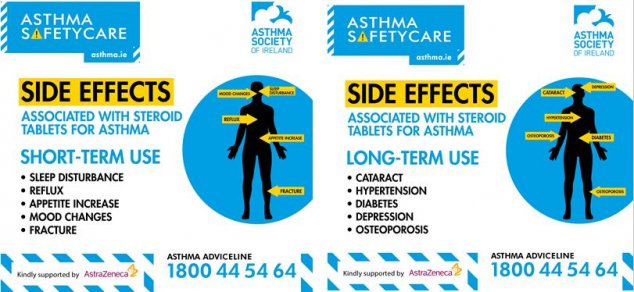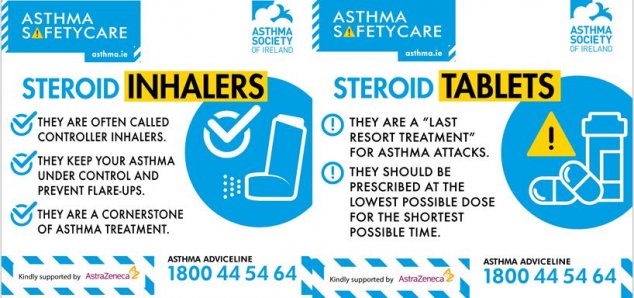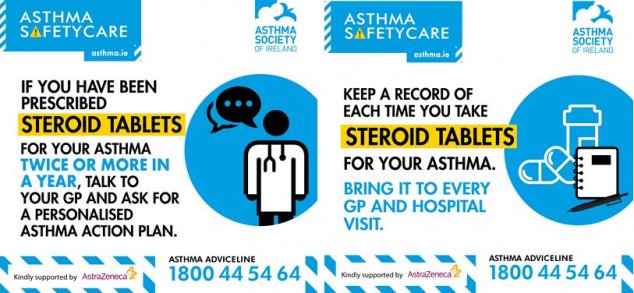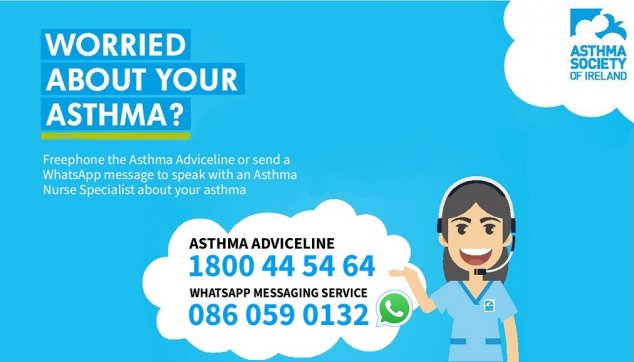The Asthma Society of Ireland reveals data-based research, commissioned to establish the level of Oral Corticosteroid (OCS) usage by people with asthma in Ireland, covering the period from November 2018 to October 2020.

- From the estimated 380,000 people affected by asthma in Ireland, almost 27% (101,997) filled a prescription for Oral Corticosteroids from a retail pharmacy in 2020.
- Over 31,000 people bought asthma inhalers in 2020 that hadn’t in the previous two years.
- Furthermore, the figures indicate Oral Corticosteroid use amongst children fell by almost a third from 2018 to 2020 by 31%.
- Despite this, there has been an alarming increase in Oral Corticosteroid use among a small but vulnerable group of patients whose numbers have increased between 2019 and 2020 by a staggering 26%.
Oral Corticosteroid is a medical term for steroid tablets. They are an anti-inflammatory medicine prescribed for a wide range of conditions, including asthma and COPD. They are typically prescribed for two purposes in asthma - short courses are commonly used to treat asthma attacks or they can be prescribed as ongoing daily maintenance therapy for patients with severe asthma.
Oral Corticosteroids can be associated with significant harmful side effects as a result of long-term use. Research now indicates that even occasional short courses of steroid tablets (Oral Corticosteroids) can be associated with increased health risks.
The continual need to prescribe steroid tablets (Oral Corticosteroids) for a patient with mild to moderate asthma should signify that they need a review by their GP. The person with asthma may not be taking their “controller” inhaler every day or they may not be using it properly.

The data also revealed, while the total number of people requiring steroid tablets for their asthma increased by 5,728 in 2019 from the previous year, the numbers decreased in 2020 by over 25,000 - a drop of 21%. Reassuringly, the figures indicate Oral Corticosteroid use amongst children fell by almost a third from 2018 to 2020 by 31% compared to 10% among adults during the same period.
Of particular concern from the findings, 18.46% of all people with asthma prescribed steroid tablets are using the medication three or more times per year, leaving them at significant risk of immediate side effects as well as cumulative health risks associated with OCS use into the future.
Commenting on the research, Sarah O’Connor, CEO of the Asthma Society of Ireland says, “While it is promising to see there was an overall decline of asthma patients needing steroid tablets over the past three years, especially amongst children, it is concerning that 82,511 people still filled up to two steroid prescriptions in 2020, indicating occasional loss of control of their asthma and the need to manage their condition.
I would like to encourage patients who have had two or more asthma attacks over the course of a year requiring OCS treatment, to contact their GP and request an asthma review and updated personalised Asthma Action Plan. This recommendation has been made in the Global Initiative for Asthma guidelines for healthcare professionals.”

Despite the overall drop in OCS usage, there has been an alarming increase in Oral Corticosteroid use among a small but vulnerable group of people (4,212) whose numbers have increased between 2019 and 2020 by a staggering 26%. These are patients who have collected OCS prescriptions three months or more in a row and are being prescribed consistent dosages over those months. The Asthma Society is particularly concerned about this group of patients. Independent of dose, prolonged use of steroid tablets has proven to be problematic for severe asthma patients - experts claiming that they ‘could not find a well-founded threshold for side-effects of OCS or a dosing window for a “safe” long-term use.

Dr Marcus Butler, Respiratory Consultant at St Vincent's University Hospital and Medical Director at the Asthma Society of Ireland remarks, "Due to the Covid-19 pandemic, people have been isolating at home, wearing masks and washing hands more frequently and we are therefore seeing a drop in steroid tablet use in 2020 amongst asthma patients, which is heartening. Unfortunately, prolonged use of OCS medication has severe health implications. In the short term, side effects can include sleep disturbance, mood changes, appetite increase and hyperglycaemia while depression, diabetes, hypertension, and adrenal suppression are more of an issue in the longer term. It’s important to remember that OCS is the last tool we should reach for in our toolbox and a focus on improving better asthma control and management are preferred."
Responding to the research Dr Dermot Nolan, GP, National Clinical Lead on Asthma to the HSE and Advisor to the Asthma Society says, "If you are not taking your controller inhaler treatment every day, you may experience an asthma attack or flare-up that will require treatment with steroid tablets.
The best way for people with mild to moderate asthma to avoid needing steroid tablets is to take their controller inhaler medication every day - even when you feel well. We know from our research that almost 31,000 people bought asthma inhalers in 2020 that hadn’t in the previous two years so we would like to encourage this trend to continue and ask that people have their reliever inhaler available for when their symptoms flare.
In addition, try to maintain the positive hygiene habits in your household that were promoted during the pandemic – regular handwashing, coughing or sneezing into your elbow, disinfecting surfaces regularly and controlling the spread of cold and flu. It is also important to get the flu vaccine every year and COVID-19 vaccines as advised.
A good rule of thumb is that if you have experienced two or more asthma attacks in one year requiring steroid treatment, then contact your GP and request an asthma review. Do NOT stop steroid therapy without talking to your doctor first as doing so could be dangerous.”

Dan Wygal, Country Director of AstraZeneca said, “We are delighted to support the Asthma Society in this of important piece work. Today’s research highlights major challenges with achieving optimal asthma management by patients and clinicians alike. It is essential that patients receive the appropriate treatment and know when to speak to their clinician should their symptoms exacerbate.”
Furthermore, the Asthma Society calls for urgent increased state funding to continue its life-saving work, which includes patient services, health promotion, awareness and advocacy initiatives that would allow it to fully utilise the findings of this research to the benefit of people with asthma.
Remember that your asthma is uncontrolled if:
- you often wheeze, cough or are short of breath
- you often need to use your reliever inhaler
- your activity is limited by your asthma
- your sleep is disrupted by your asthma
- you have been hospitalised with your asthma in the past year
- you have needed (OCS) steroid tablets for your asthma twice or more in a year”



